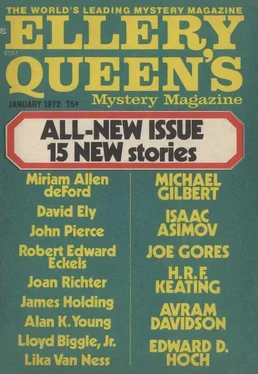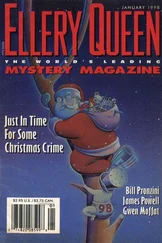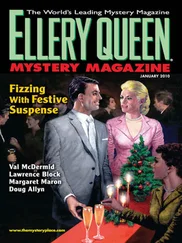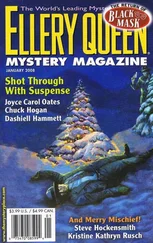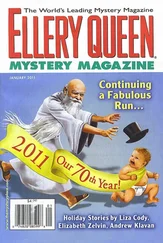Isaac Asimov - Ellery Queen’s Mystery Magazine, Vol. 59, No. 1. Whole No. 338, January 1972
Здесь есть возможность читать онлайн «Isaac Asimov - Ellery Queen’s Mystery Magazine, Vol. 59, No. 1. Whole No. 338, January 1972» весь текст электронной книги совершенно бесплатно (целиком полную версию без сокращений). В некоторых случаях можно слушать аудио, скачать через торрент в формате fb2 и присутствует краткое содержание. Город: New York, Год выпуска: 1972, Издательство: Davis Publications, Жанр: Детектив, на английском языке. Описание произведения, (предисловие) а так же отзывы посетителей доступны на портале библиотеки ЛибКат.
- Название:Ellery Queen’s Mystery Magazine, Vol. 59, No. 1. Whole No. 338, January 1972
- Автор:
- Издательство:Davis Publications
- Жанр:
- Год:1972
- Город:New York
- ISBN:нет данных
- Рейтинг книги:5 / 5. Голосов: 1
-
Избранное:Добавить в избранное
- Отзывы:
-
Ваша оценка:
- 100
- 1
- 2
- 3
- 4
- 5
Ellery Queen’s Mystery Magazine, Vol. 59, No. 1. Whole No. 338, January 1972: краткое содержание, описание и аннотация
Предлагаем к чтению аннотацию, описание, краткое содержание или предисловие (зависит от того, что написал сам автор книги «Ellery Queen’s Mystery Magazine, Vol. 59, No. 1. Whole No. 338, January 1972»). Если вы не нашли необходимую информацию о книге — напишите в комментариях, мы постараемся отыскать её.
Ellery Queen’s Mystery Magazine, Vol. 59, No. 1. Whole No. 338, January 1972 — читать онлайн бесплатно полную книгу (весь текст) целиком
Ниже представлен текст книги, разбитый по страницам. Система сохранения места последней прочитанной страницы, позволяет с удобством читать онлайн бесплатно книгу «Ellery Queen’s Mystery Magazine, Vol. 59, No. 1. Whole No. 338, January 1972», без необходимости каждый раз заново искать на чём Вы остановились. Поставьте закладку, и сможете в любой момент перейти на страницу, на которой закончили чтение.
Интервал:
Закладка:
“Keep going,” said Kearny.
“Ruth just grabbed the gun from the glove compartment and ran across the little clearing. I ran after her but she stopped and — and—” She started to cry.
“There’s no time for that now!” snarled the stocky detective to her tears. “Let’s have it.”
“She put the gun against her head and it made such a little noise.” Her eyes were puzzled now. “Like a twig breaking. Then she fell down.”
“Where have you been since then?” asked Kearny.
“I paid for a Lombard Street motel with a credit card and just stayed there. I wanted to shoot myself but I couldn’t. Tonight the radio said they had found Ruth. I knew then that I had to come here and get the negatives, so she wouldn’t have died for nothing.”
“Just dumb luck she made it here without being spotted by the cops,” said Kearny. He swung back to her. “Where did you leave the Lincoln?”
“On Montgomery. In front of Julius’s Castle.”
“Give me the keys.” She did. He said to Wright, “The pawnbroker isn’t about to identify the gun, since he sold it to her illegally in the first place. So if the cops find it here beside the body with only Edwards’ fingerprints on it—”
The squat detective’s eyes narrowed. He paused in his picture shuffling. “Yeah. It’ll work. And they’ll think Edwards burned whatever was in the safe before he did himself in. Yeah. Hand her over to Dick, tell him to take her back to her old man so his doctor can knock her out before they call in the police. I’ll—”
“You’ll bum the pictures,” said Kearny. “While I watch.”
Wright laughed, then handed a slim sheaf of them to Kearny. As Myra had said, they were indescribably nasty — acts performed by people strung out on the mind-altering psilocybin. The things people got themselves into while looking for kicks. It was lucky Edwards was dead or Kearny might have been tempted to do the job himself. He handed the pictures back.
“Burn them,” he said harshly. “All of them.”
The squat durable detective did. A good man, good when the trouble started. Myra drifted away into the fog with Dick’s hand on her arm. The Lincoln was parked by the closed restaurant, as she had said, and the key started it. No cops spotted Kearny getting it back to the DKA garage…
Kearny came to with a start, found himself slumped in his chair, his head hanging over the back at an odd angle, the edge of the typing stand digging into him. He groaned. His stomach hurt, his neck was stiff. Must have fallen asleep after getting the Lincoln—
Mists of sleep and dream cleared. He dug strong fingers into the back of his neck. Midnight and after, and he and Jeanie still faced a night of trimming the tree. The kids were at an age when Santa arrived while they slept, so Christmas morning dawned to awe and delight.
He stood up. Damned neck. Sleep and dream. Dream.
Dream.
Dammit! He’d fallen asleep over the Bannock file, with Stewart Carroll’s wife’s suicide on his mind, and Ruth Bannock’s death, and had dreamed the whole crazy thing! Fog. Cable cars. The house on Telegraph Hill.
He rubbed his neck again. So damned vivid; but there was no Greenwich Street cable car. Had there ever been? Catfish Row was now Napier Lane. And the Christmas trees now had, not candles, but strings of electric lights. Goats and the smell of wine were both long gone, fifty years or more, from Telegraph Hill.
He flipped through the big maroon Polk Cross-Street Directory to 491 Greenwich. Mike’s Grocery. In the dream, a tavern. And in the dream, an Oakland ferry: they had stopped running a dozen years before. No Bay Bridge either — it had been built in the ’thirties. As had Treasure Island, also missing from the dream, man-made in 1938, ’39, as a home for the San Francisco World’s Fair.
All so damned vivid. Usually a dream faded in a few minutes, but this one had remained, sharp and clear.
Kearny started to sit down, frowning, then stood up abruptly and felt his topcoat hanging on the rack. Damp. It should have dried off from the rain he’d ducked through this afternoon. Well, it hadn’t, that’s all. A better way to check: merely pull open the middle drawer of the filing cabinet to look at the Luger—
The Luger was gone.
Kearny stood quite still with the hairs tinging on the back of his sore neck. Then he slammed the drawer impatiently shut. Hell, it could have been missing for weeks.
But what if the Luger was found in a yellow house on Telegraph Hill, a house with a dead body in the basement and a safe full of ashes? So? The gun had never been registered, and it was tougher to get fingerprints off them than people realized.
Dammit, he thought, stop it. It had been a dream, just a dream. And despite the dream he still had to find the Bannock Lincoln before the deadline. He strode around the desk, slid back the glass door, stuck his head out to look down the garage.
Kearny’s face felt suddenly stiff. Bright gleam of chrome and black enamel. Correct license plate. He went out, stiff-legged like a dog getting ready to fight, rapped his knuckles on the sleek streamlined hood. Real. The Bannock Lincoln. How in hell—
Larry Ballard, of course. Larry had been working the case, had spotted the car, repo’d it, dropped it off in the garage without even knowing that Kearny was asleep in his sound-proofed cubbyhole.
But what if Ballard hadn’t repo’d the car?
Well, then, dammit, Kearny would dummy up some sort of report for the client. They had the car, that was the important thing. And — well, there would be some rational explanation if Larry hadn’t been the one who’d brought it in.
Kearny left the office, setting the alarms and double-locking the basement door to activate them. He walked slowly down to the Ford station wagon. What did it all add up to? A crazy dream that couldn’t be true, because it was mixed up with San Francisco of fifty years ago. Certain things seemed to have slopped over from the dream into subsequent reality, but there was a rational explanation for all of them— there must be. He would take that rational explanation, every time. Dan Kearny was not a fanciful man.
He reached for his keys in the topcoat pocket and touched a small oblong of thin cardboard. He looked at it for a long moment, then with an almost compulsive gesture he flipped it into the gutter between his car and the curb. It had probably been in his pocket for a week — people were always handing him business cards. Especially guys in his own racket, guys with little one-man outfits sporting those impressive-sounding names.
Kearny snorted as he got into the station wagon. What was the name on his business card? Oh, yeah.
Continental Detective Agency.
I think I have invented a new kind of procedural detective story — what might be termed a “procedural fantasy.” While it uses the dream “story-within-a-story” which antedates even William Langland’s The Vision of Pierce Plowman (1550), it is also a Files Series procedural.
There are numerous clues in the story that suggest it is a dream, beginning with Kearny and Jimmy Wright walking past Kearny’s car as if it doesn’t exist in the time continuum the two men now inhabit. Some clues — for example, candles on Christmas trees — should be apparent to all readers; others — such as the nonexistent Bay Bridge — would obviously have more significance to those who are familiar with San Francisco.
Because the story grew out of my personal conviction that San-Francisco-in-the-fog still belongs to Dashiell Hammett, I have inserted quite a few clues pointing to the identity of Jimmy Wright.
First, the plot was frankly adapted from Hammett’s masterly Continental Op story, The Scorched Face ; even DKA’s client (Golden Gate Trust) was borrowed from it, as were the first names of other characters.
Читать дальшеИнтервал:
Закладка:
Похожие книги на «Ellery Queen’s Mystery Magazine, Vol. 59, No. 1. Whole No. 338, January 1972»
Представляем Вашему вниманию похожие книги на «Ellery Queen’s Mystery Magazine, Vol. 59, No. 1. Whole No. 338, January 1972» списком для выбора. Мы отобрали схожую по названию и смыслу литературу в надежде предоставить читателям больше вариантов отыскать новые, интересные, ещё непрочитанные произведения.
Обсуждение, отзывы о книге «Ellery Queen’s Mystery Magazine, Vol. 59, No. 1. Whole No. 338, January 1972» и просто собственные мнения читателей. Оставьте ваши комментарии, напишите, что Вы думаете о произведении, его смысле или главных героях. Укажите что конкретно понравилось, а что нет, и почему Вы так считаете.
